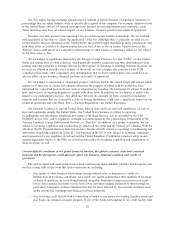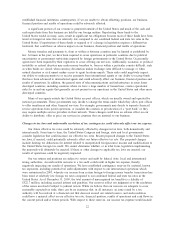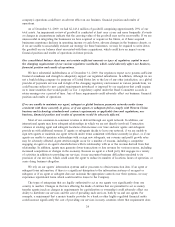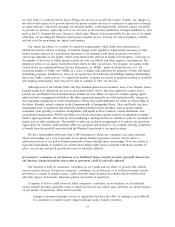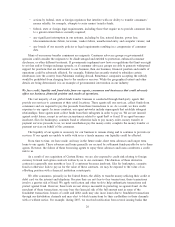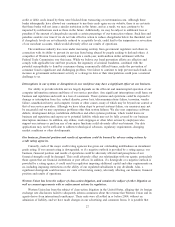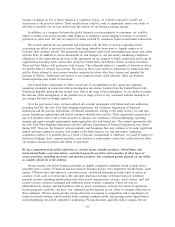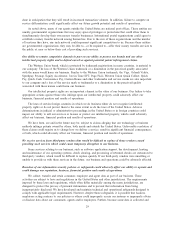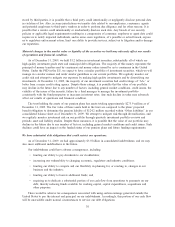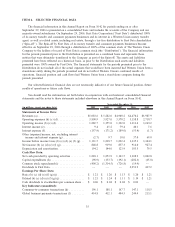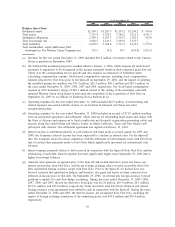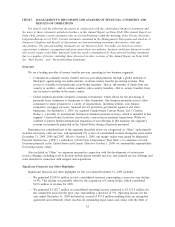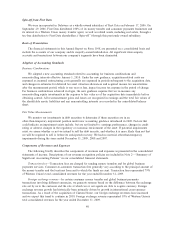Western Union 2009 Annual Report Download - page 44
Download and view the complete annual report
Please find page 44 of the 2009 Western Union annual report below. You can navigate through the pages in the report by either clicking on the pages listed below, or by using the keyword search tool below to find specific information within the annual report.stored by third parties, it is possible that a third party could intentionally or negligently disclose personal data
in violation of law. Also, in some jurisdictions we transfer data related to our employees, consumers, agents
and potential employees to third-party vendors in order to perform due diligence and for other reasons. It is
possible that a vendor could intentionally or inadvertently disclose such data. Any breach of our security
policies or applicable legal requirements resulting in a compromise of consumer, employee or agent data could
require us to notify impacted individuals, and in some cases regulators, of a possible or actual breach, expose
us to regulatory enforcement action, limit our ability to provide services, subject us to litigation and/or damage
our reputation.
Material changes in the market value or liquidity of the securities we hold may adversely affect our results
of operations and financial condition.
As of December 31, 2009, we held $1.2 billion in investment securities, substantially all of which are
high quality investment grade state and municipal debt obligations. The majority of this money represents the
principal of money transfers sent by consumers and money orders issued by us to consumers in the United
States. Under the PSD in the EU, we expect to have a similar portfolio of investment securities, which we will
manage in a similar manner and under similar guidelines as our current portfolio. We regularly monitor our
credit risk and attempt to mitigate our exposure by making high quality investments and by diversifying our
investments. At December 31, 2009, the majority of our investment securities had credit ratings of “AA-” or
better from a major credit rating agency. Despite those ratings, it is possible that the value of our portfolio
may decline in the future due to any number of factors, including general market conditions, credit issues, the
viability of the issuer of the security, failure by a fund manager to manage the investment portfolio
consistently with the fund prospectus or increases in interest rates. Any such decline in value may adversely
affect our results of operations and financial condition.
The trust holding the assets of our pension plans has assets totaling approximately $275.9 million as of
December 31, 2009. The fair value of these assets held in the trust are compared to the plans’ projected
benefit obligation to determine the pension liability of $124.2 million recorded within “Other liabilities” in our
consolidated balance sheet as of December 31, 2009. We attempt to mitigate risk through diversification, and
we regularly monitor investment risk on our portfolio through quarterly investment portfolio reviews and
periodic asset and liability studies. Despite these measures, it is possible that the value of our portfolio may
decline in the future due to any number of factors, including general market conditions and credit issues. Such
declines could have an impact on the funded status of our pension plans and future funding requirements.
We have substantial debt obligations that could restrict our operations.
As of December 31, 2009, we had approximately $3.0 billion in consolidated indebtedness, and we may
also incur additional indebtedness in the future.
Our indebtedness could have adverse consequences, including:
• limiting our ability to pay dividends to our stockholders;
• increasing our vulnerability to changing economic, regulatory and industry conditions;
• limiting our ability to compete and our flexibility in planning for, or reacting to, changes in our
business and the industry;
• limiting our ability to borrow additional funds; and
• requiring us to dedicate a substantial portion of our cash flow from operations to payments on our
debt, thereby reducing funds available for working capital, capital expenditures, acquisitions and
other purposes.
There would be adverse tax consequences associated with using certain earnings generated outside the
United States to pay the interest and principal on our indebtedness. Accordingly, this portion of our cash flow
will be unavailable under normal circumstances to service our debt obligations.
30


